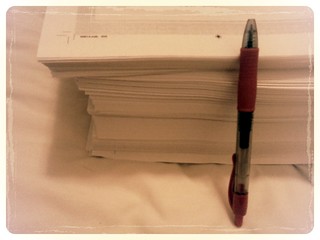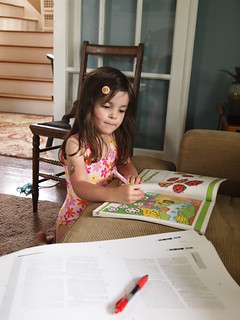I’m in the middle of a huge editing project. (Every page in that almost-1,000-page stack is filled with 10-point type, single spaced.) When tackling this same project in the past, I’ve only worked on it after the kids have gone to bed. This year, to avoid 2am bedtimes, I’ve started immediately after dinner. I’m not sure why, in the past, I’ve felt an obligation to continue changing diapers, playing Candy Land and reading picture books once Andy was home. Asking him to take over has made this project easier and me, a more sane person. It’s been a good lesson: That it’s OK to stop, hand over, let things go, allow the dust bunnies in the corners to sit a while longer.
I’m also trying to do some editing during the day. But, I’m often interrupted. To illustrate:
• “MOMMY! I HAVE A BOOGER!” (I look up to find Owen standing in front of me with, indeed, a huge booger on the tip of his finger.)
• “Can I have a snack?” (Sophie. I get her a small bowl of applesauce. Resume editing.) “Can I have cinnamon on my applesauce?” (I get her cinnamon. Resume editing.) “Can I have some milk, please?” (I get her milk. Resume editing.) “I need a napkin!” (I get her a napkin. Resume editing.) “I need more milk. Please.” (Give up editing.)
• “My train. My train! MOMMY! FIX MY TRAIN!” (James then falls into a sobbing heap on the floor as he can’t get his Thomas train back on its tracks. I then spend five minutes myself trying to get said train—and freight cars—back on their tracks. Only to then be told that it’s going in the wrong direction.)
• “MOMMY! James keeps calling me a cat! I’m NOT A CAT, James! I’m O.w.en.!” (Can’t resume editing until I convince James that Owen is, indeed, not a cat. And can’t resume editing until I convince Owen that James no longer believes he’s a cat.)
• “What ya doing, Mommy?” (Sophie. Who has climbed up on my bed, aka my desk. Even though Andy is home and she is supposed to be with him. I explain.) “Oh.” (She stares.) “Can I help?” (I tell her no. Explain why. She stares.) “What do all those letters say?” (I tell her what the book is about.) “I can tell you the letters if you want. I know them!” (Thank her. Ask if she’d like to have a tea party with her dolls in her room.) “What do all those marks mean?” (Explain editing marks.) “Can I have your red pen when you’re done?” (I yell for Andy.)
• OWEN JUST TOOK MY TRAIN! OWEN JUST TOOK MY PERCY! That’s MY Percy, Owen! NO! GIVE. IT. BACK. (Sob.) Owen took my Percy!” (Editing is then interrupted every 10 minutes for the timer rule. Someone gets Percy. The other person gets to push the buttons on the microwave to set the timer for 10 minutes. When the timer rings, the two switch. It’s incredibly effective, except that my work is interrupted every 10 minutes.)
• silence (Something is wrong. I have to stop and check. Can almost guarantee James is sneaking some sort of food he shouldn’t be eating.)
• “MOMMY! You have to come upstairs RIGHT NOW. It’s-so-important-it’s-just-if-you-don’t-come-up-here-right-now-it’s-going-to-be-really-really-bad.” (I run upstairs. All seems fine. I ask Sophie what’s wrong.) “Can you brush my dolly’s hair?”
• (I’m sitting in bed, editing while listening to the kids laugh and scream outside my open window—my mom once told me about cassette tapes sent to soldiers with the recorded sound of children’s laughter, how popular they were, how needed. I then hear intense stomping on the hardwood stairs.) “Mommy! I have a special flower for you!” (I’m gifted a little white flower from our backyard tree—two of the petals ripped.) “Smell it!” (I do. I look at the face smiling up at me. Beaming, really. And I’m reminded that sometimes, sometimes, I love the interruptions.)
“The great thing, if one can, is to stop regarding all the unpleasant things as interruptions of one’s own or real life. The truth is of course that what one calls the interruptions are precisely one’s real life.” —C.S. Lewis


